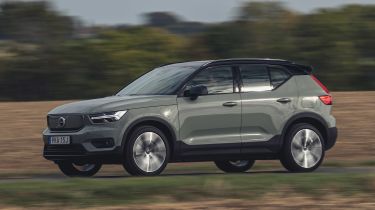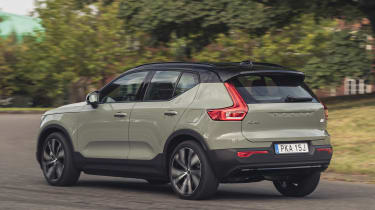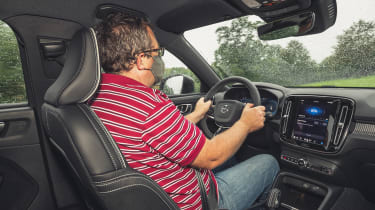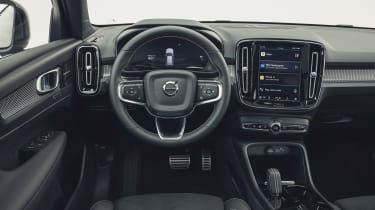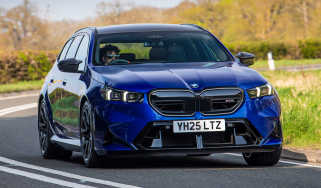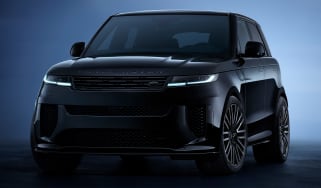New Volvo XC40 P8 Recharge 2020 review
Is the new all-electric Volvo XC40 P8 Recharge worth its nearly £60k price tag? We find out...

Verdict
The XC40 EV is a beautifully engineered creation with excellent performance, decent range, exceptional refinement and no compromise on practicality compared with regular versions. Android Automotive feels like a worthy upgrade, too. But, if anything, the P8 feels a little too potent and pricey for this size of vehicle. We’re confident that more modest versions, perhaps with a single motor and at sub-£50k, will be even more appealing.
Volvo has hit the headlines with its approach to electrification, with the company stating that half of its sales will be fully electric by 2025. But this car, the XC40 Recharge Pure Electric P8, is its first full EV. It’s a sign of how quickly Volvo has to move to meet its target - and a reminder of how important this new model is.
Of course, we’ve tried a plug-in XC40 before, because Volvo already sells a hybrid version. But don’t think that the XC40 P8 is really just a PHEV with bells on, because the car’s CMA (Compact Modular Architecture) platform has allowed the firm’s engineers to pack in specs that are punchy, to say the least.
The XC40 P8’s lithium-ion battery has a capacity of 78kWh (usable capacity is 75kWh) and this powers a pair of identical electric motors - one on each axle - producing a combined total of 402bhp and 660Nm. That’s a serious amount of power and torque for a small family SUV and, sure enough, the electric XC40’s performance figures are startling: 0-62mph takes a whisker under five seconds, and the top speed is 112mph - relatively high for an EV.
Used - available now
The perils of adding extra cells are aptly demonstrated by the XC40’s mass and range, mind you. This car weighs 2.2 tonnes - hefty for something with the footprint of a Ford Focus - and as a result, even that large battery can only manage 260 miles between charges. That’s respectable, not stellar.
At least you get 150kW DC charging as standard, capable of adding up to 80 per cent of capacity in 40 minutes (or around 55 miles of range every 10 minutes). That hefty battery means that home charging is a bit more of a chore, of course, but a full charge on a domestic wallbox can take from less than eight hours - so overnight charging shouldn’t be a problem.
The pricing is every bit as hefty as the weight and performance - but it doesn’t help that here we’re sampling the First Edition that is the only version available at launch. Still, we can only test what’s put in front of us and, at a whopping £59,985, this is a seriously expensive XC40 - the thick end of £20k more pricey than anything else in the range (even the plug-in hybrids), and way beyond the reaches of the Plug-in Car Grant.
Of course, it’s better to compare this car with other EVs of its size - and there aren’t too many of those. The Jaguar I-Pace is larger and more expensive (although not by much), but BMW’s iX3 is a closer match, starting from almost £62,000 while offering a bit more cabin space, luggage capacity, and range than the XC40. Volvo’s offering is in the mix, in other words - but on paper, far from a stand-out favourite.
It stacks up well when you get behind the wheel, though. The first thing you’ll notice is that there’s no starter button; the car uses a seat sensor to trigger its key detection, so you can just get in, push it into D and drive, like a Tesla.
Once you’re on the move, you’re likely to be surprised by just how refined the XC40 P8 is - because it’s impressively hushed. There’s next to no electric motor whine to speak of - no mean feat when you have a front-mounted unit as well as one on the rear axle - and wind noise is also well suppressed. Cut out these frequencies and you’re left with a bit of rumble from the chunky wheels on the road below you, but that’s about your lot.
Volvo engineers say they’ve tried to simplify the driving experience, so you won’t get any steering wheel-mounted paddles to give false gearshifts or different levels of brake energy recuperation. Instead, the latter is controlled by a single toggle switch on the infotainment screen; you either coast when you lift your foot off the throttle, or the car captures energy that would otherwise be lost under braking to the point when the vehicle comes to a halt. Using this mode (and we would), you can drive using only the right-hand pedal.
It’s notoriously tricky to get the modulation right on this sort of set-up, and the initial step-off in the XC40 P8 takes a little getting used to. But, thereafter, the progression feels very natural, and we were comfortable using single-pedal mode within a couple of junctions of setting off.
In the other direction, the XC40 feels every bit as fast as its figures suggest - not Tesla Ludicrous-Mode rapid, perhaps, but more than capable of punching you in the kidneys if you’re too aggressive with the throttle. Indeed, the chassis isn’t really up for being thrown around with this sort of performance, either; body control is solid enough but you can feel the mass, low down though it is, when you try to perform sudden changes of direction at speed.
Like so many other EVs and SUVs, then, this isn’t really a car for involvement. There is a heavier steering setting, should you want a bit more weight when you’re pushing on, but it’s a relatively small difference, and doesn’t really add much to the experience. At least the engineers have done a good job of masking the XC40’s extra weight and big alloy wheels when it comes to ride, because it’s surprisingly compliant in most situations.
We’d question, though, why Volvo has believed it necessary to pack more than 400bhp into an XC40 at all. Company execs freely admit that single-motor, front-wheel-drive variants are on the way - and we suspect that an example with around 220bhp and EV instant torque will be fast enough for most needs, and a better dynamic fit for the model.
Inside, the most obvious difference between this XC40 and its stablemates - at least until the rest of the range gets a facelift - is increased resolution on the portrait-layout infotainment screen and the fully digital instrument panel. But this is also the first Volvo to feature an infotainment system powered by Android Automotive.
First seen on the Polestar 2, this system is far more than ‘Android Auto turned up to 11’; it’s properly hooked up to the car’s infrastructure, programming an alarmingly accurate estimate on how much battery you’ll have left at the end of a journey into the navigation, for example. And, of course, that ecosystem is all Google-based so, assuming you tick the data-release boxes, it’s properly stitched into your life.
Even based on our short test, it makes the regular XC40’s Sensus set-up seem old. And that’s before its in-built version of the Google Play Store gets populated with bespoke car apps, or the overall system gets improved by the over-the-air updates that it supports.
First Edition cars get pretty much every item on the XC40 equipment list with a panoramic sunroof, front parking sensors and 360-degree surround-view camera, a Harman Kardon stereo, 20-inch alloy wheels, heated steering wheel, heated front and rear seats, premium metallic paint and an induction charging pad for smartphones.
The integration of the electric powertrain into the CMA platform hasn’t resulted in any major compromises in practicality, meanwhile. The boot capacity remains respectable for the class, and there’s room in the cabin for four fully grown adults. Plus Volvo has added an extra 31-litre load bay where the combustion engine would usually be - handy for everything from charging cables to a big carton of windscreen washer fluid.
| Model: | Volvo XC40 P8 Recharge Pure Electric AWD First Edition |
| Price: | £59,985 |
| Engine: | Twin electric motors, 75kWh battery |
| System power: | 402bhp/660Nm |
| Transmission: | Single-speed auto, four-wheel drive |
| 0-62mph: | 4.9 seconds |
| Top speed: | 112mph |
| Range: | 260 miles |
| Max charging: | 150kW |
| On sale | Now |

